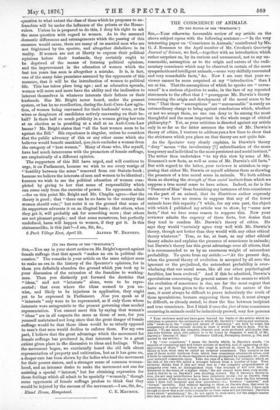[To THE EDITOR OF THE "SPECTATOR.") SIR,—You say in your
short notice on Mr. Bright's speech against -female suffrage that that speech "makes an era in political dis- ‘cussion." The remarks in your article on the same subject seem to make an era in the history of the Spectator's opinions, for in them you definitely abandon the ground which you took up in .your discussion of the extension of the franchise to working- men. Then you distinctly put forward the doctrine that "ideas," and not "interests" alone, were to be repre- -sented ; that even where the ideas seemed to you un- wise, and likely to be injurious in application, they ought yet to be expressed in Parliament. Now you speak as if " interests " only were to be represented, as if only those whose .interests were antagonistic to the present governing class needed .representation. You cannot meet this by saying that women's " ideas " are in all respects the same as those of men, for you yourself maintained not long since that the great danger of female suffrage would be that those ideas would be so utterly opposed to men's that men would decline to enforce them. For my own part, I believe that the great advantage which the movement for ,female suffrage has produced is, that interests have to a great extent given place in the discussion to ideas and feelings. When the movement began, we continually heard the old talk about representation of property and cultivation, but as it has gone on, .a deeper care has been shown by the ladies who lead the movement for their poorer sisters, and a stronger sense of common woman- hood, and an intenser desire to make the movement not one for assisting a special " interest," but for obtaining expression for those feelings which all admit to be specially " womanly," though some opponents of female suffrage profess to think that they would be injured by the success of the movement.—I am, Sir, &c.,


































 Previous page
Previous page